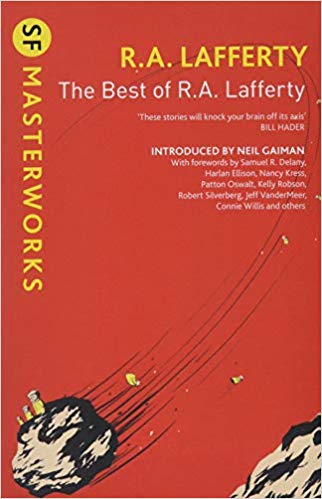Book Review: The Best of R.A. Lafferty by R.A. Lafferty
Raphael Aloysius Lafferty (1914-2002) was one of those “American originals” you hear about every so often. His writing takes some form from the American tall tale, some from Native American yarn spinning, and mixes it into a style all his own. This anthology collects 22 of his finest short stories.

There’s an introduction to the book by big fan Neil Gaiman, talking about how influential Lafferty was on his own work. Each story also has an introduction by a writer talking about how much Lafferty or a particular story means to them. Most are new for this volume, but Harlan Ellison’s ™ intro to “Land of the Great Horses” is reprinted from its first appearance in Dangerous Visions.
The stories proper start with “Slow Tuesday Night”, with the gimmick that a way has been found to reduce the time it takes humans to make decisions. As a result, events that once took decades to occur happen multiple times in any given eight-hour period. We follow entrepreneur Basil Bagelbaker (Lafferty liked alliteration) as he goes from rags to riches and back again multiple times. Marriages are over almost as soon as they’ve been contracted. It’s a madcap world, quite exciting, but seems to have lost its ability to savor a long moment.
“Days of Grass, Days of Straw” concludes the volume. Here it turns out there are days that are not in the regular calendar, amazing days where people live different lives, often much more fulfilling. But there’s also danger, because each “day of grass” must be wrestled from God, and this is no easy or safe task. And it’s made even more difficult because one does not remember the days out of the calendar…most of the time.
Some of my favorites:
“Nine Hundred Grandmothers”: A space explorer learns that the local aliens are de facto immortal. They just get smaller and sleep more the older they get. He realizes the oldest grandmothers may have some answers to the oldest questions, but the greed for knowledge has consequences just like the greed for money.
“Land of the Great Horses” gives a possible explanation for the origins of the Roma people. And then it happens to someone else. It’s an inventive and compelling story. Note though, it uses some ethnic slurs that were a lot more accepted in 1967.
“The World as Will and Wallpaper”: William Morris decides to explore the world, a future world ordered and amazing. He even reaches the Wood Beyond the World. But what lies beyond that? A bleak, dystopian story with a killer ending.
I wasn’t so fond of “Selenium Ghosts of the Eighteen Seventies” about an early television experiment. It just goes on and on before turning out to be a funding pitch. And “Continued on Next Rock” about an archaeological dig caught in the middle of an unrequited wooing had no characters I cared for enough to make the journey worth it.
Lafferty’s unique style and interesting notions make most of this collection well worth picking up. You may want to take it more piecemeal than I did, though, as the unique style also begins to grate in large doses.
Recommended to SF and fantasy fans who enjoy offbeat stories.

